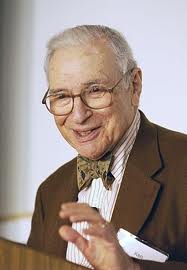The Arrow’s impossibility theorem
 The Arrow’s Theorem of Impossibility takes its name from its creator, Kenneth Arrow that formulated it in 1951 and was awarded with the Nobel Prize for Economics in 1972. Thanks to Arrow’s work, the problem of collective decision-making has become meticulously rigorous and his results, which, as is often the case for impossibility theorems, is slightly destabilizing, is often quoted through paradoxical slogans such as: “The only democratic voting system is dictatorship!”
The Arrow’s Theorem of Impossibility takes its name from its creator, Kenneth Arrow that formulated it in 1951 and was awarded with the Nobel Prize for Economics in 1972. Thanks to Arrow’s work, the problem of collective decision-making has become meticulously rigorous and his results, which, as is often the case for impossibility theorems, is slightly destabilizing, is often quoted through paradoxical slogans such as: “The only democratic voting system is dictatorship!”
But what does the Arrow theorem really say? First, Arrow lists a series of axioms that he believes a system of social choice should have to be “democratic”. So a system is perfectly democratic if it respects all of the Arrow’s axioms and all the Arrow’s axioms are respected in a perfectly democratic system. Arrow shows that all these axioms can not be respected simultaneously with the consequence that a perfectly democratic system can not exist. Obviously everything is played on what these axioms are and whether it is really reasonable to claim that they are all respected. The relaxation of one or more of these axioms is characterized by the existing social choice systems used in reality. Formally, the topic of the theorem is a hypothetical social choce criterion. That is, a law that allows you to switch from a set of individual preferences to a set of social preferences. This law could be one of the voting criteria we mentioned in the previous paragraph, for example, the majority. Let’s check one by one Arrow’s axioms, which when are taken individually seem simple and perfectly reasonable. They are features that seem natural to be expected from a social choice criterion. Yet all together, at the same time, have a devastating effect.
- Non banality: there must be at least two voters and at least three alternatives in the chosen system of choice. Well … it’s trivial!
- Unrestricted domain, or universality: there must be no restrictions on voter preferences. That is, each voter may have the most different preferences among the possible alternatives. The state should not address the problem of morality or rationality of citizens’ choices, otherwise it would deny theyr sovereignty.
- Monotonicity: the function of social choice must have the same sign of voters’ choices. That is, if an elector increases his or her preference towards a candidate, the function of social choice must reflect this increase or, at least, remain unchanged. It can not decrease.
- Citizen sovereignty: if the social choice prefer A over B then there must be at least one voter who prefers A over B.
- Unanimity or Pareto Efficiency: if all voters prefer A over B then the social criterion should also prefer A over B. By the same token, if all but one voter is indifferent to A and B then the only unimportant preference is preferable. This axiom is actually equivalent to the two previous ones So in some formulas the theorem is present and in the others the other two.
- Independence of irrelevant alternatives or binary relevance axiom: This is the property we talked about in the Borda method. The law of social choice must be such that the preference between two alternatives must not be affected by the other options in the game.
- Rationality: the rule must provide a complete and transitive All possible options. That is, if A> B and B> C then A> C .
- Non-dictatorship: The collective choice rule should not be determined by the choice of a single citizen. Arrow in fact defines “dictator” a citizen whose personal preferences also become global preferences
Before starting the theorem demonstration let’s make some preliminary observations regarding axioms.
Of the first axiom, that of non-banality, we can say that in the presence of two alternatives the voting system by majority suits all the other axioms. And it is also the only one. If we relax the request of the binary relevance, the Borda mechanism satisfies all the other axioms.
The Arrow theorem shows that there is no system that satisfies all axioms above but is sometimes enunciated without the axiom of non-dictatorship and saying that the only system that satisfies all the other axioms is actually a dictatorship.
 -0
-0  )
)
Leave a Reply